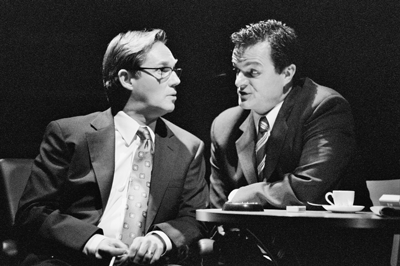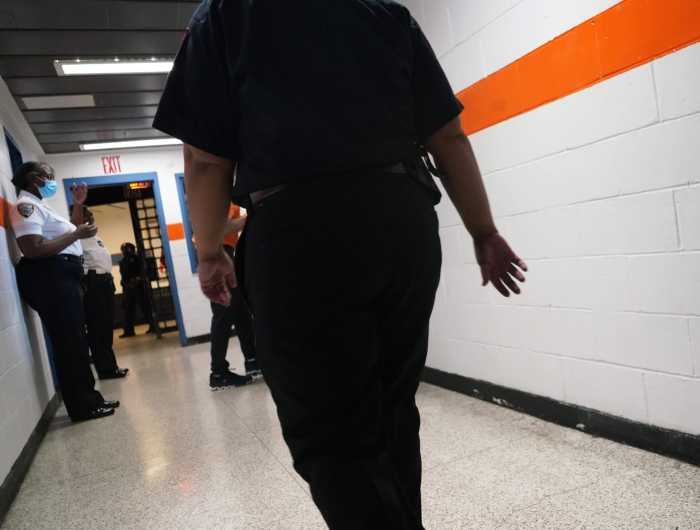Michael Frayn’s “Democracy” looks at the epic personal struggles of a political history
The stark, gray sausage factory of politics has always been fodder for theater.
There is the jingoistic pandering of Shakespeare to the court of Elizabeth I or the current spate of plays and performance pieces that have elevated outrage at the Bush administration almost to a genre unto itself.
It’s easy to see why. In politics, as in pornography, we see all the most elemental human instincts vying for attention from ego gratification to physical release to the mammalian drive to establish dominance and create a pack of followers. It is the perfect platform for metaphor and it is always relevant because from the War of the Roses to the War on Terrorism, politics requires conflict, and conflict is inherently dramatic. Whether it’s Henry V stirring his soldiers at Agincourt with lies about St. Crispian or Condoleezza Rice spinning lies of WMD on Sunday talk shows, the drama is the same. It is not the truth that wins the day but the story that stirs catharsis that triumphs.
No matter where on the political spectrum you call home, it is a rare person who is not moved first by the theater rather than the facts. And the best players know it’s a game and play to win, to ride the tide as long as possible knowing only too well that because they are playing with the very nature of humans, the tide inevitably turns.
There are certainly strident plays that explore this dynamic—the recently closed “Guantánamo: Honor Bound to Defend Freedom” leaps to mind. And there is Philip Roth’s current and intriguing novel “The Plot Against America,” that explores the dark side of the cult of personality that surrounds politics. Yet neither of these comes near the subtle grace nor the astonishing emotive power of Michael Frayn’s “Democracy,” now at the Brooks Atkinson Theatre.
In telling the fictionalized tale of the rise and fall of Chancellor Willy Brandt, Frayn uses one major plot line—the existence of a spy within Brandt’s office—to explore the dynamic of the quest to gain and keep power. It is a story of intrigue and Machiavellian plotting, and it is the story of a charismatic leader in part undermined by his own urges. The parallels to Bill Clinton are at times too evident to be avoided.
But “Democracy” is also a study of what goes on in the heart behind the stories because both Brandt and the spy in his office, Günther Guillaume, come to realize that though they are on opposite sides of ideology, they absolutely require one another to define themselves both personally and politically. The ultimate irony, and what makes the last half of the second act nothing less than thrilling, is that ultimately for everyone the larger story makes both Brandt and Guillaume irrelevant. The Berlin Wall comes down, the political tide turns and the world goes on, unmoved and unaffected by the mere human scrabbling that was nothing more than a minor disturbance blown into epic proportions by the ego.
One might think this is cynical, but as written by Frayn and finely directed by Michael Blakemore, the play gets its life and much of its impact by simply refusing to comment on the events that unfold. The play is not about a political agenda but simply an examination of human nature and the stages we choose on which to play. What makes the production so powerful is that every element deals with the inherent conflicts and the search for balance. The marvelously austere two-level set by Peter J. Davison, for example, is a physical representation of the duality of human nature—and Blakemore uses it brilliantly to draw the separation between public and private life and to show how the boundaries are penetrated and the whole is weakened, but though the players may change, the game continues.
The acting is uniformly excellent. James Naughton as Brandt has the sex appeal and charm of every great politician at the height of his power, but also conveys the resignation of one fading into obscurity after his fall. When Brandt is brought back and lionized as an architect of the dissolution of the separation of East and West Germany, he is a shell who might as well be made of wax. The fatigued sense of doing one’s duty though one’s time is decidedly past throws into relief his charismatic rise to power and the sense that it is not Brandt the man but Brandt the symbol that the current powers want. (It was impossible not to think of the Reagan funeral at this point.)
Naughton’s understated performance is one of the best you’ll see on Broadway this year.
Richard Thomas as Guillaume is warmer than Naughton and equally compelling. Guillaume’s tragedy, if one can call it that, is that he never stops believing that what he was doing mattered in the long run. In Thomas’ performance, Guillaume’s spark never goes out, though he is broken and abandoned, the irony being that fanning that spark into a flame is what every regime requires for its validation and power. His part is more textured than Naughton’s, but the two men together create a small dynamic within huge events that is the heart of this play.
Robert Prosky is good as the scheming Herbert Wehner, and Michael Cumpsty brings his usual proficiency and strong presence to the role of Arno Kretschman, Guillaume’s spy contact. The rest of the company is equally good. In particular, John Dosset has some wonderful moments as Helmut Schmidt, whom Frayn writes as a kind of Richard III lusting for power and frustrated along the way before he gets the prize, and Julian Gamble has some wry moments as Ulrich Bauhaus, Brandt’s personal helper. You may think of “All About Eve” when Guillaume starts to take over some of Bauhaus’ duties.
The lighting by Mark Henderson is extraordinary, with the smallest variations in color and brightness underscoring entire scenes and relationships in ways that are often moving.
Though I valiantly tried, I never connected to Frayn’s “Copenhagen,” and to be honest, “Democracy” takes a good 15 minutes to grab you and take hold. As with Shakespeare, it requires patience to get to know who the players are and to understand their relationships. But give “Democracy” the time it deserves, for once you’re hooked, you’re in for an exciting, original and transfixing evening.

































